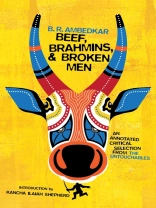One of twentieth-century India’s great polymaths, statesmen, and militant philosophers of equality, B. R. Ambedkar spent his life battling Untouchability and instigating the end of the caste system. In his 1948 book The Untouchables, he sought to trace the origin of the Dalit caste. Beef, Brahmins, and Broken Men is an annotated selection from this work, just as relevant now, when the oppression of and discrimination against Dalits remains pervasive.
Ambedkar offers a deductive, and at times a speculative, history to propose a genealogy of Untouchability. He contends that modern-day Dalits are descendants of those Buddhists who were fenced out of caste society and rendered Untouchable by a resurgent Brahminism since the fourth century BCE. The Brahmins, whose Vedic cult originally involved the sacrifice of cows, adapted Buddhist ahimsa and vegetarianism to stigmatize outcaste Buddhists who were consumers of beef. The outcastes were soon relegated to the lowliest of occupations and prohibited from participation in civic life. To unearth this lost history, Ambedkar undertakes a forensic examination of a wide range of Brahminic literature. Heavily annotated with an emphasis on putting Ambedkar and recent scholarship into conversation, Beef, Brahmins, and Broken Men assumes urgency as India witnesses unprecedented violence against Dalits and Muslims in the name of cow protection.
Зміст
Introduction: No Democracy Without Beef: Ambedkar, Identity, and Nationhood, by Kancha Ilaiah Shepherd
Fool’s Errand: A Note on the Notes to and Selection from Ambedkar’s The Untouchables, by S. Anand and Alex George
Selections from B.R Ambedkar’s The Untouchables: Who Were They and Why They Became Untouchables?
Preface
Part IV: New theories of the origin of Untouchability.
9: Contempt for Buddhists as the root of Untouchability
10: Beef-eating as the root of Untouchability
Part V: The new theories and some hard questions
11: Did the Hindus never eat beef?
12: Why did non-Brahmins give up beef-eating?
13: What made the Brahmins become vegetarians?
14: Why should beef-eating make Broken Men Untouchable?
Part VI: Untouchability and the date of its birth
15: The Impure and the Untouchables
16: When did Broken Men become Untouchables?
The Broken Men theory: Beginnings of a Reading, by Alex George and S. Anand
References
Acknowledgments
Index
Про автора
Bhimrao Ramji Ambedkar (1891–1956) was a radical thinker, economist, jurist, philosopher, and founder of a school of Buddhism. A prolific writer, he was the chief architect of the Indian Constitution and independent India’s first law minister. In 1935, he publicly declared that though he was born a Hindu, he would not die as one. Ambedkar eventually embraced Buddhism a few months before his death in 1956.Alex George, a philosophy graduate from Birkbeck College, London, is an editor with Navayana, an independent anticaste press.S. Anand is the cofounder and publisher of Navayana. He is the coauthor of the graphic biography Bhimayana: Experiences of Untouchability (2011) and editor of the annotated edition of Ambedkar’s Annihilation of Caste (2014).Kancha Ilaiah Shepherd, best known for Why I Am Not a Hindu: A Sudra Critique of Hindutva Philosophy, Culture, and Political Economy, is a political thinker. His latest book is From a Shepherd Boy to an Intellectual: My Memoirs. He lives in Hyderabad.












